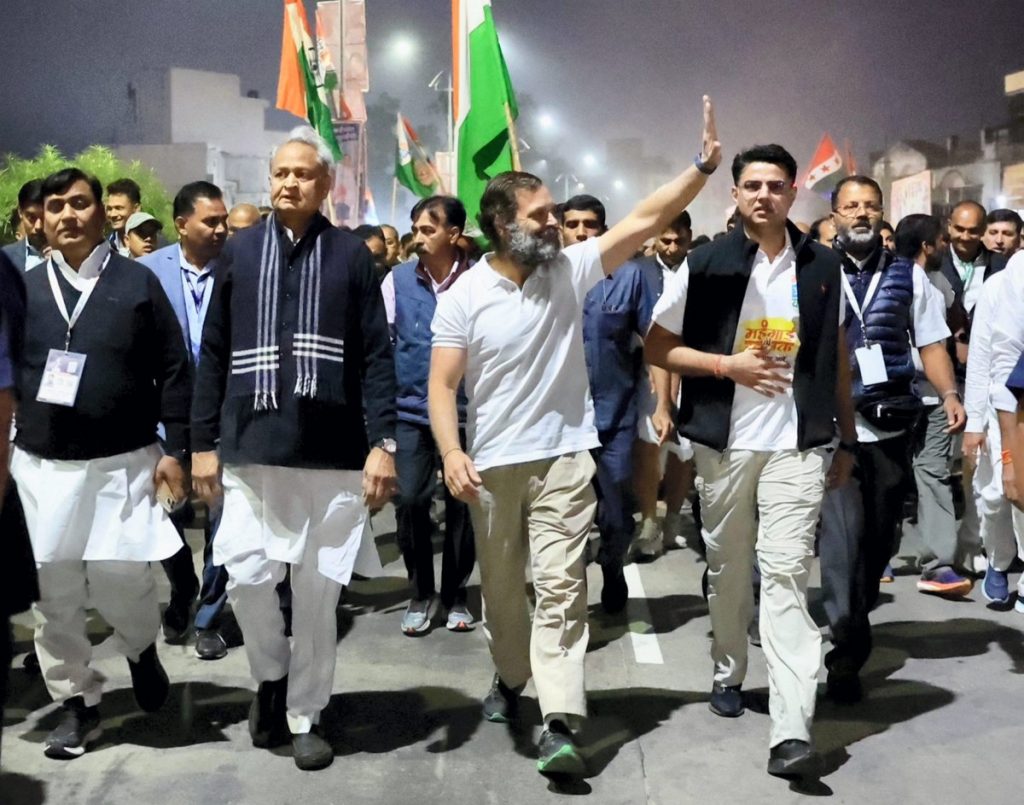Former Congress president Rahul Gandhi on Friday asserted that his party was the only party which would ultimately take down the BJP. However, he did not elaborate how that would be possible unless the organisation was strengthened to meet the challenge posed by the saffron brigade with its well-oiled and robust machinery.
While it is true that the Bharat Jodo Yatra is attracting the attention of the common people, particularly on its route through various states, its management leaves a lot to be desired. It completed 100 days and this period has helped Rahul, who was described as a non-serious politician, to change his image to a large degree.
The message of the Yatra from Kanyakumari to Kashmir is to emphasise the idea of India through the prism of the Congress and amplify the need for unity as opposed to the divisive politics pursued by the BJP.
What ails the Yatra is that the Congress workers who want to meet up with their leader are being barricaded by a small coterie that has taken complete charge of the Yatra. The possible fallout of this could that the new persons who are identifying themselves with the grand old party may not be absorbed in the organisation since there is no infrastructure that has been created to do so.
The coterie has insulated Rahul from the cadre and unless he mixes and mingles with them, the impact of his walking multiple kilometres every day would not find consolidation so far as the organisation strength is concerned. This course correction should be immediately done if gains have to be made and sustained.
In Congress, it has always been the practice for those who get close to the leadership to keep those who wish to be close, out of bounds. Former UP Youth Congress leader, the late Rati Ram Bhatti, was once asked by P.V. Narasimha Rao to come and see him at his house, when the two met at a wedding reception in Delhi. Knowing the Congress inside out, Bhatti said that he would come the next day, but he (Rao) should ensure that he was not stopped at the gate. The then Prime Minister smiled, since he acknowledged what Bhatti was alluding to was correct and informed him that instructions would be left at the gate to let him in.
Bhatti, incidentally, was the man responsible for getting Priya Ranjan Dasmunshi elected as the president of Indian Youth Congress in the early 1970s, when a feud broke out between the Northern and Southern delegates attending the IYC convention at Indore during the Chief Ministership of Shyama Charan Shukla.
The coterie culture is responsible for alienating the leadership from many of the party well-wishers, since insecure people surrounding the power centre block those who they perceive could pose a threat to their existence. It may be happening in every political party, but in the Congress, this is extremely pronounced.
The reason why R.K. Dhawan became so powerful during the Indira Gandhi era was that he would often choose people who could get an appointment with the Prime Minister. It is another matter that Indira Gandhi had her own style of functioning and would get feedback from multiple sources. Somewhere in the early 1980s, Mohammad Shamim, a senior journalist close to Indira Gandhi, was prevented by Dhawan from meeting her. Mrs Gandhi was livid when she came to know about this and admonished her aide publicly, while telling him that in future Shamim should be immediately escorted to her room, even if there was a Cabinet meeting going on.
Rajiv Gandhi too had his coterie and it was divided into two camps. When he secured Arun Nehru’s resignation at the instance of the other faction, he inquired from his political secretary, Makhan Lal Fotedar as to what would be the consequences. Fotedar thought for a while and said that he should be prepared for retaliation. Rajiv became very nervous, and in a few weeks, the Bofors scandal broke out.
The late Sanjay Gandhi had his coterie during the Emergency and the media after the Congress rout in 1977 held Bansi Lal, V.C. Shukla and Om Mehta, amongst others, to be responsible for misguiding the party. Later Sanjay depended more on his close friends Kamal Nath and Akbar Ahmed, besides the common Congress workers.
When Sonia Gandhi took over as the party chief, she started off very well, but soon a coterie surrounded her. At a later stage, she wanted to promote Rahul Gandhi, but this did not suit the coterie which felt threatened that the new power centre would erode their influence. Some members of this coterie thus started this silent campaign to denigrate Rahul, and his being described a “Pappu” was not because of the BJP to begin with, but Congressmen themselves.
Rahul Gandhi, if he has to succeed in the long run, must recognise the pitfalls of those who are surrounding him and barricading the cadre. He has to demonstrate that he is a serious politician who also comprehends the powerplay in his own organisation. For instance, there was no need to summon newly elected MLAs from Himachal Pradesh to join the Yatra in Rajasthan. The signal which went out was that more than the Congress president Mallikarjun Kharge, Rahul and the Gandhis called the shots.
The Congress has a long way to go if it has to beat the BJP. The first step has to be the strengthening of its organisation. Between us.
Yatra popular but poorly managed
- Advertisement -

